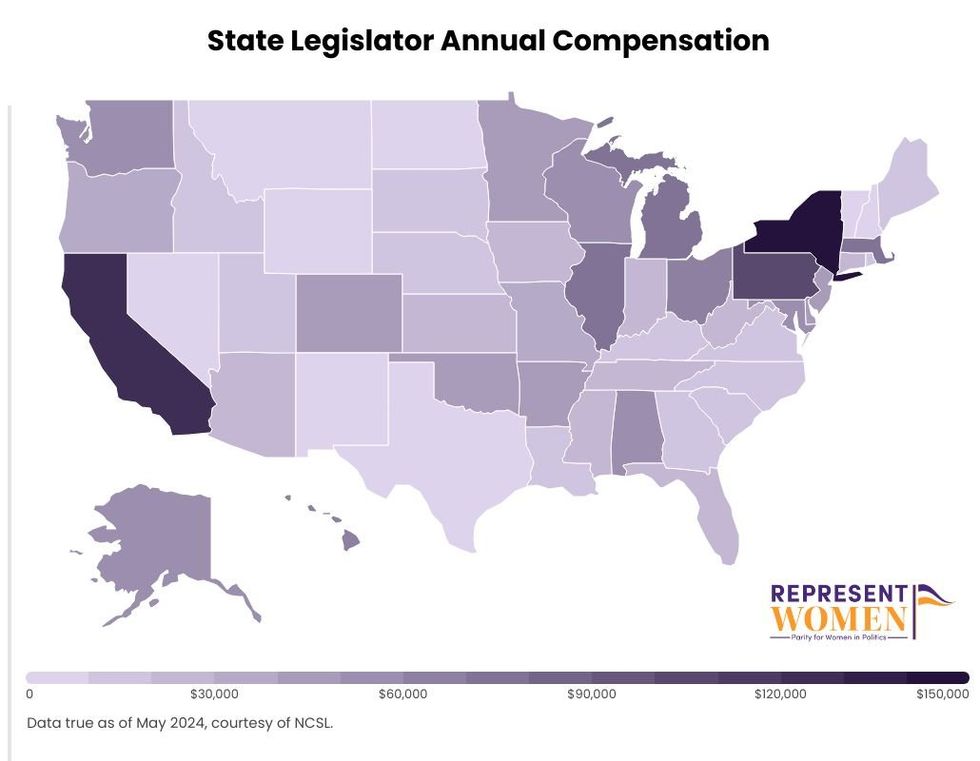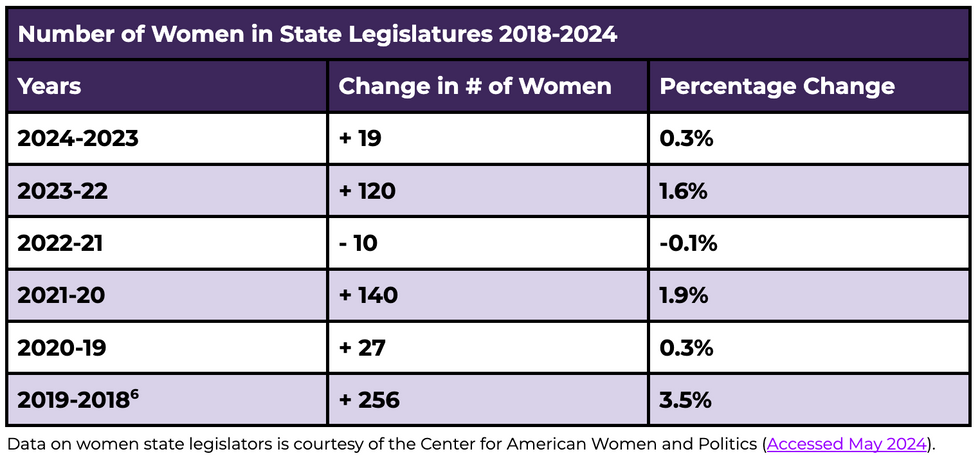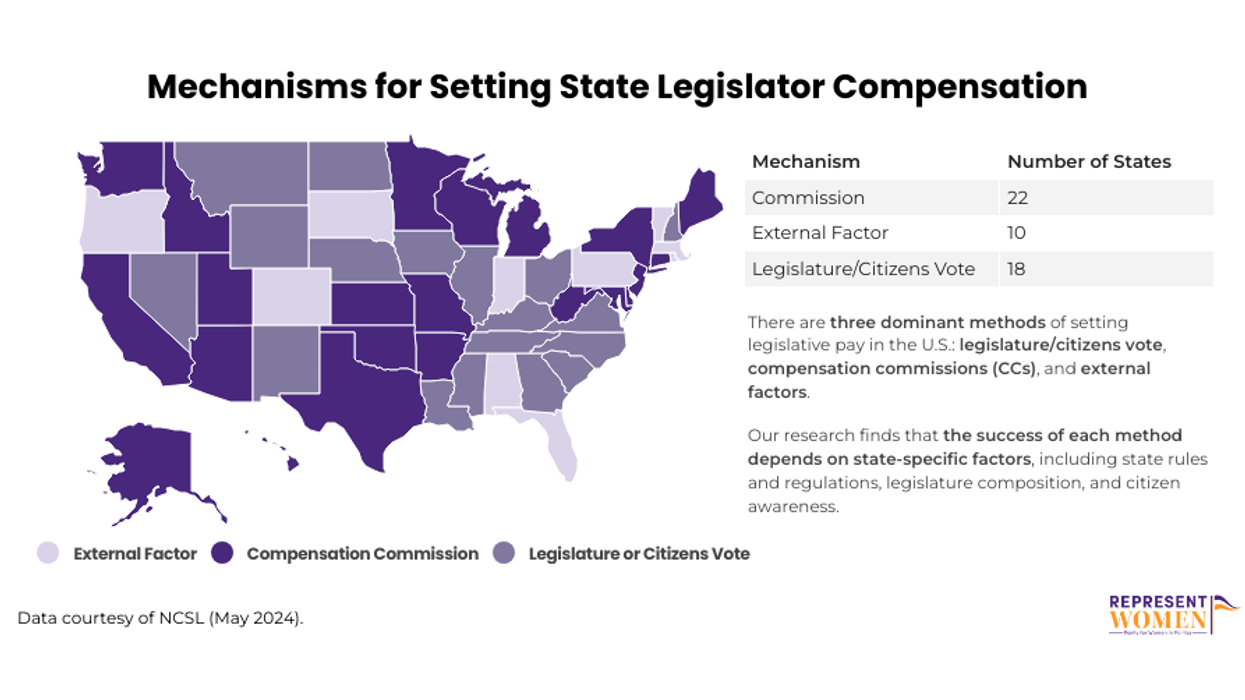Conte is the communications manager for RepresentWomen. Scaglia is the research manager for RepresentWomen.
From meeting with constituents to passing legislation to taking care of their families, state legislators routinely spend well over 40 hours a week serving their communities. This commitment, regardless of gender or if the legislature is full- or part-time, is often a determining factor in who runs for and stays in office.
The legislative pay problem
The “perennial pay problem,” as we call it in our recent report “ Salaries of State: Modernizing State Legislatures through Compensation Commissions,” is by no means new. State legislative pay has been a contentious topic for decades, with little standardization on whether legislatures should be part-time or full-time, citizen or career legislatures.
As a result, legislator compensation varies wildly between states. For example, California’s legislators are paid $140,000 on the high end, and New Mexico’s legislators are uncompensated for their service.

Our findings are clear: Higher pay benefits legislators and constituents alike, as it increases elected officials’ capacity to govern. Without a need for additional employment to cover costs like child care, legislators are more productive, miss fewer votes, and introduce more bills.
Legislators or voters setting salaries exacerbates the perennial pay problem. Perhaps counterintuitively, legislators have little incentive to raise their wages because they will likely be penalized at the ballot box. Voters are also unlikely to propose or approve an increase in legislator pay, as they may feel this is unfair or unwarranted.
Better pay means legislators have more time to solve the issues faced by those who elected them. Fair pay also means legislators will be more responsive to constituent concerns and less incentivized to give in to special interests.
Fair pay enables more women to serve
Ensuring fair pay is also crucial for a second reason: Without a livable wage, legislators, particularly women, cannot serve in office for a long time.
Women routinely face more household, financial, and caregiving responsibilities than men, making balancing two jobs much more difficult. Without enough compensation to sustain themselves and their families, women often report waiting until they are retired, no longer have young children, or are financially independent to run for office.
Fair representation in political office is vital to a truly representative democracy. Women account for 51 percent of the U.S. population but only 33 percent of state legislators. Moreover, women’s representation is unevenly distributed between states: 60 percent of Nevada’s Legislature is women, while West Virginia’s Legislature has just 12 percent women. Only two states, Nevada and Arizona, have reached or surpassed gender parity in the legislature.

Legislative outcomes are shaped by more than who holds office. Decision makers shape which policy and legislative issues are discussed in the first place. Multiple studies show the benefits of having women in the workplace, and politics is no different. Elected officials legislate based on lived experience; with women at the decision-making table, their problems are less likely to be left at the bottom of the agenda.
Compensation commissions are a viable solution
RepresenWomen research finds that compensation commissions remove many of the barriers legislators face when working to increase pay directly and facilitate a diverse political environment where more women are incentivized to run for office and have the
means to stay once elected. Independent compensation commissions are already used in 22 states, though each state may have specific rules and regulations on managing legislator pay.
Depending on the state, commission recommendations may take effect automatically, need legislator approval, or go to voters via ballot measure. Regardless, this is a much more viable pathway than legislators or voters setting pay.
Compensation commissions remove bias — commission members obtain no benefits from increasing (or decreasing) legislator salaries, reassuring voters that their legislators are paid fairly without outside influences. Commissions also monitor external factors impacting salaries, such as automatic cost-of-living adjustments. This can be especially useful when unexpected events impact state budgets, a common issue in the wake of the COVID-19 pandemic.
Voters favor establishing compensation commissions. Polling by Common Cause New Mexico shows that most voters (62 percent) approve of independent salary commissions taking charge of compensation setting, and an even more significant majority (72 percent) want legislators removed from this process.
Compensation commission rules matter
Establishing a compensation commission is the first step to ensuring fair pay for legislators. Commission rules and regulations directly impact its success in reducing bias and raising wages. In states where recommendations don’t take effect automatically and need additional legislative approval, necessary salary changes are much less likely to happen. This is unsurprising, as legislator approval defeats the purpose of having a third-party compensation commission in the first place.
Kansas, one of the case studies in our report, provides a perfect example. Before 1998, the Kansas Compensation Commission required legislative approval on salary increases for legislators, leading to stalled wages. In 1999, after a rule change, salary recommendations went into effect automatically, increasing legislative salaries. In 2023, additional recommendations were made to boost legislator pay by a third-party compensation commission and were met with great success. Kansas legislators will see a salary increase in 2025 that brings pay from $22,000 to $43,000, slightly above the Midwestern median income of $41,000.
Take action! Contact your legislators,
Higher compensation for state legislators is undoubtedly necessary and deserved. Legislators’ dedication to their work and constituents should not be undervalued. Furthermore, constituents want policymakers with the financial resources and governing capacity to remain in office. For women, low wages are one of the determining factors that prevent them from seeking office in the first place.
The United States is already on an inconsistent path toward political gender balance. Without systems solutions that level the playing field for women, we are unlikely to achieve gender parity within our lifetimes. Our report provides solutions to some systemic reforms needed to ensure women can run, win, and lead in their communities. Contact your legislators directly to encourage them to learn how they intend to support legislature modernization.



















Trump & Hegseth gave Mark Kelly a huge 2028 gift